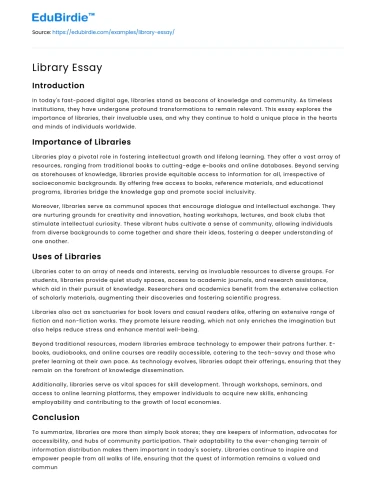Introduction
In today's fast-paced digital age, libraries stand as beacons of knowledge and community. As timeless institutions, they have undergone profound transformations to remain relevant. This essay explores the importance of libraries, their invaluable uses, and why they continue to hold a unique place in the hearts and minds of individuals worldwide.
Importance of Libraries
Libraries play a pivotal role in fostering intellectual growth and lifelong learning. They offer a vast array of resources, ranging from traditional books to cutting-edge e-books and online databases. Beyond serving as storehouses of knowledge, libraries provide equitable access to information for all, irrespective of socioeconomic backgrounds. By offering free access to books, reference materials, and educational programs, libraries bridge the knowledge gap and promote social inclusivity.
Save your time!
We can take care of your essay
- Proper editing and formatting
- Free revision, title page, and bibliography
- Flexible prices and money-back guarantee
Moreover, libraries serve as communal spaces that encourage dialogue and intellectual exchange. They are nurturing grounds for creativity and innovation, hosting workshops, lectures, and book clubs that stimulate intellectual curiosity. These vibrant hubs cultivate a sense of community, allowing individuals from diverse backgrounds to come together and share their ideas, fostering a deeper understanding of one another.
Uses of Libraries
Libraries cater to an array of needs and interests, serving as invaluable resources to diverse groups. For students, libraries provide quiet study spaces, access to academic journals, and research assistance, which aid in their pursuit of knowledge. Researchers and academics benefit from the extensive collection of scholarly materials, augmenting their discoveries and fostering scientific progress.
Libraries also act as sanctuaries for book lovers and casual readers alike, offering an extensive range of fiction and non-fiction works. They promote leisure reading, which not only enriches the imagination but also helps reduce stress and enhance mental well-being.
Beyond traditional resources, modern libraries embrace technology to empower their patrons further. E-books, audiobooks, and online courses are readily accessible, catering to the tech-savvy and those who prefer learning at their own pace. As technology evolves, libraries adapt their offerings, ensuring that they remain on the forefront of knowledge dissemination.
Additionally, libraries serve as vital spaces for skill development. Through workshops, seminars, and access to online learning platforms, they empower individuals to acquire new skills, enhancing employability and contributing to the growth of local economies.
Conclusion
To summarize, libraries are more than simply book stores; they are keepers of information, advocates for accessibility, and hubs of community participation. Their adaptability to the ever-changing terrain of information distribution makes them important in today's society. Libraries continue to inspire and empower people from all walks of life, ensuring that the quest of information remains a valued and communal effort. We must appreciate, support, and actively engage in the enriching world of libraries in order to fully grasp the treasures therein.
FAQs
- What is the significance of libraries?
Libraries are vital institutions that provide equitable access to knowledge, foster intellectual growth, and promote lifelong learning. They serve as communal spaces that encourage dialogue and creativity, creating a sense of community among diverse individuals. With their diverse resources, libraries bridge the knowledge gap and support academic, professional, and personal development. Moreover, they act as repositories of cultural heritage and facilitate research, contributing to scientific progress and societal advancement. In essence, libraries play a crucial role in empowering individuals and communities, ensuring the dissemination of information for the betterment of society as a whole.






 Stuck on your essay?
Stuck on your essay?

